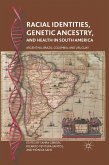This study focuses on the conceptualization of Roma ethnicity in the works of human geneticists. In this analysis I apply the methods of intersectionality and use expert interviews to collect data. The collected material is analyzed from a non-Romani feminist constructivist perspective. In the research of human geneticists the categories of diseases are at the centre and they link the Roma category systematically to genetic disorders. I argue however that this connection non-intentionally stabilizes the Roma category on a molecular biological level because this aspect fails to take into consideration the performative character of social categories. Geneticists by attaching the Roma category to a biological marker homogenize the culturally fragmented and diverse gypsy ethnicities and they reconstruct the Romani people's social structures along the lines of traditional gender hierarchies.
Bitte wählen Sie Ihr Anliegen aus.
Rechnungen
Retourenschein anfordern
Bestellstatus
Storno








